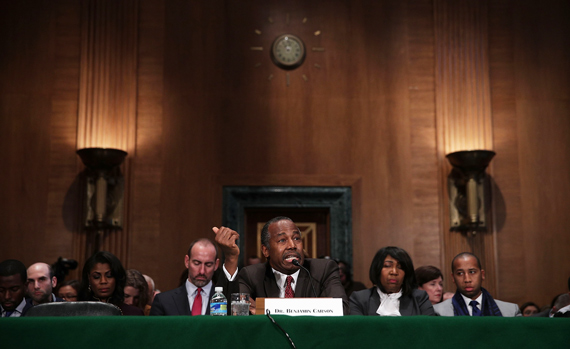Dr. Ben Carson entered his first day of testimony before the U.S. Senate Committee on Banking, Housing and Urban Affairs on Thursday, presenting the case for why he, a former pediatric neurosurgeon, is qualified to lead the Department of Housing and Urban Development, the nation’s top housing agency. The hearing spanned thorny issues such as the future of Fannie and Freddie, potential conflicts of interest with President-elect Donald Trump’s businesses, and the role housing assistance plays in addressing problems of systemic poverty.
In the hearing’s first hour, Ohio Senator Sherrod Brown raised concerns over Carson’s previous critiques of the agency’s efforts to incentivize desegregative housing development in American cities, which Carson once compared to “failed socialist experiments” of the 1980s.
“I don’t have any problem with affirmative action or integration,” Carson replied to Brown, “but I do have a problem with people on high dictating when they don’t have any idea what’s going on in the area.”
Later, Massachusetts Senator Elizabeth Warren asked Carson if he could promise that no money from HUD would benefit the business holdings of Mr. Trump or any of his family members. Carson refused to give Warren a satisfactory yes or no answer.
“It will not be my intention to do anything for any American particularly, it’s for all Americans,” Carson said.
“Do I take that to mean that you may manage programs that will significantly benefit the president-elect?” Warren asked.
“You can take it to mean that I will manage things in a way that benefits the American people, that is going to be the goal,” the nominee said.
Brown, a Democrat, would bring the topic up once more, questioning Carson on Trump’s stake in the Starrett City affordable housing complex in Brooklyn, which has received HUD assistance.
When asked if Carson would develop a process to investigate possible conflicts of interest at Starrett City with the president-elect, Carson was more receptive. “I will work with you to set that up,” he said.
Questions from the banking committee members covered a broad range of other topics, such as lead poisoning in public housing, funding for Community Development Block Grants (CDBGs), housing on Indian Reservations and mortgage policy.
Although Carson commended many of the past and present efforts of the government agency, he frequently emphasized the importance on private-sector solutions. While the government is limited in its ability to spend, the private sector is “the place where there is a lot of money,” Carson said.
Senator Jon Tester from Montana asked Carson what he thought the future of government-backed 30-year home mortgages should be. Carson — who has never been elected to office or led a government agency — said he thought there should be more “private entities” in the market and said it was possible that private banks would continue to loan 30-year mortgages without the guarantee of government. When Tester asked how this was possible, Carson simply answered “with the private sector.” Carson did, however, say he supported some kind of “backstop” for mortgage lending.
On the issue of rental assistance, Carson was perhaps most sympathetic of HUD’s role. “I think the rental assistance program is essential,” he said, “it is cruel and unusual punishment to withdraw those programs before you provide an alternative.”
But when pressed on HUD’s overall budget, the former Republican presidential candidate didn’t offer many clues about how much funding he would fight for. Although Carson said he would “advocate for the HUD budget” and create a “world-class plan” for housing, he did not give any indication of how much money the agency would need to do that.
“I don’t know what that number is going to be quite frankly,” Carson said, “it might be more, it might be less.”
